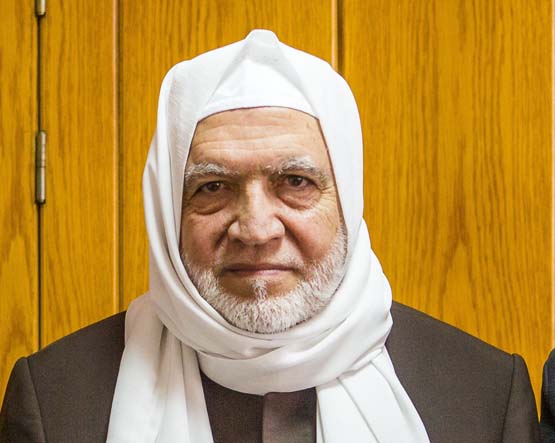About
Sheikh Osama al-Rifai, one of the leading figures of the Syrian Sunni ulama, was born in the capital Damascus in 1944. His father is Abdulkerim al-Rifai, who is also a famous Damascus scholar. Osama al-Rifai, who received his university education on the Arabic language at the University of Damascus, started his duty as an imam in the Abdulkerim al-Rifai mosque, which was named after his father, in Damascus, right after his graduation in 1971. In the process that resulted in a small-scale uprising between the regime and Islamic groups in Syria in the late 1970s, Rifai, who was accused of being affiliated with the "Muslim Brotherhood" group and was pressured by the Assad regime, left the country in 1981 and lived in exile in Saudi Arabia until 2000. Rifai, who returned to the country after the death of Hafez Assad and Bashar Assad's coming to power, continued his religious studies as an active scholar in the capital, while also pioneering aid activities by taking advantage of the flexible attitudes of the Assad regime from time to time. This movement, in which he was active with his brother Sariya al-Rifai, was known as the Zayd Jamaat. During the days of the uprising, Rifai, who took a position with the demands of the people and the opposition, was battered with his congregation in the Abdulkerim al-Rifai mosque in Damascus after the attack of the regime security units and militias in August 2011 (Qadr Night in the month of Ramadan). The treatment faced by a well-liked and respected scholar like Rifai in Damascus also led to an increase in the number of Sunni ulama who acted with the opposition. After a short while, he left the country and came to Turkey and revived the movement of the Union of Scholars in Damascus, which had been dormant for many years, with the participation of other scholars from Syria. In April 2014, he established the Syrian Islamic Council in Istanbul and started to lead a structure that supports the revolution and meets the fatwa/opinion needs of the opposition. In November 2021, Bashar Assad's decision to abolish the office of Grand Mufti of Syria was not accepted by the opposition, while the Syrian Islamic Council announced that Osama al-Rifai was elected as the Grand Mufti of Syria. This decision was accepted and congratulated by various opposition political and military groups.
Sheikh Osama al-Rifai, one of the leading figures of the Syrian Sunni ulama, was born in the capital Damascus in 1944. His father is Abdulkerim al-Rifai, who is also a famous Damascus scholar. Osama al-Rifai, who received his university education on the Arabic language at the University of Damascus, started his duty as an imam in the Abdulkerim al-Rifai mosque, which was named after his father, in Damascus, right after his graduation in 1971. In the process that resulted in a small-scale uprising between the regime and Islamic groups in Syria in the late 1970s, Rifai, who was accused of being affiliated with the "Muslim Brotherhood" group and was pressured by the Assad regime, left the country in 1981 and lived in exile in Saudi Arabia until 2000. Rifai, who returned to the country after the death of Hafez Assad and Bashar Assad's coming to power, continued his religious studies as an active scholar in the capital, while also pioneering aid activities by taking advantage of the flexible attitudes of the Assad regime from time to time. This movement, in which he was active with his brother Sariya al-Rifai, was known as the Zayd Jamaat. During the days of the uprising, Rifai, who took a position with the demands of the people and the opposition, was battered with his congregation in the Abdulkerim al-Rifai mosque in Damascus after the attack of the regime security units and militias in August 2011 (Qadr Night in the month of Ramadan). The treatment faced by a well-liked and respected scholar like Rifai in Damascus also led to an increase in the number of Sunni ulama who acted with the opposition. After a short while, he left the country and came to Turkey and revived the movement of the Union of Scholars in Damascus, which had been dormant for many years, with the participation of other scholars from Syria. In April 2014, he established the Syrian Islamic Council in Istanbul and started to lead a structure that supports the revolution and meets the fatwa/opinion needs of the opposition. In November 2021, Bashar Assad's decision to abolish the office of Grand Mufti of Syria was not accepted by the opposition, while the Syrian Islamic Council announced that Osama al-Rifai was elected as the Grand Mufti of Syria. This decision was accepted and congratulated by various opposition political and military groups.

